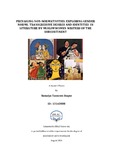| dc.contributor.advisor | Karim, Shuchi | |
| dc.contributor.author | Haque, Sumaiya Tasneem | |
| dc.date.accessioned | 2014-08-28T05:42:45Z | |
| dc.date.available | 2014-08-28T05:42:45Z | |
| dc.date.copyright | 2014 | |
| dc.date.issued | 2014-08-14 | |
| dc.identifier.other | ID 13163008 | |
| dc.identifier.uri | http://hdl.handle.net/10361/3491 | |
| dc.description | This thesis is submitted in a partial fulfillment of the requirements for the degree of Master of Arts in English, 2014. | en_US |
| dc.description | Cataloged from PDF version of thesis. | |
| dc.description | Includes bibliographical references (page 44-48). | |
| dc.description.abstract | Prevailing Non-Normativities: Exploring Gender Norms, Transgressive Desires and Identities in Literature by Muslim Women Writers of the Subcontinent is an exploration of essentialist gender norms, transgressive desires, deviant sexual practices and identities persisting within heteronormative framework structured around marriage normativity and reinforced heterosexuality as the norm within institution of south Asian subcontinent. Hence, the current analysis focuses on literature by Mamlukul Fatema Khanam (1894-1957), Ismat Chughtai (1911-1991) and Taslima Nasreen (1962) under the lens of feminism. Using selected literary pieces by the chosen Muslim women writers, I have examined the ways in which they are anti-hegemonic in terms of heteronormativity, compulsory heterosexuality and marriage. Societal values, norms, culture, religion, patriarchy and other internal and external influences often contributes formation of distinct gender performance and the shaping of one’s sexuality. Hence, within both public and private sphere, there is existence of pluralities, ambiguous identities and gender and sexual performances that does not confirm to the norms. Women’s emancipation through higher education, employment, mobility and increasing financial solvency enabled women in voicing their lived sexuality and sexual desires. Hence, the works produced by the selected writers can thus be viewed as their bold effort harking towards women’s empowerment through articulation of their aspirations. | en_US |
| dc.description.statementofresponsibility | Sumaiya Tasneem Haque | |
| dc.format.extent | 49 pages | |
| dc.language.iso | en | en_US |
| dc.publisher | BRAC University | en_US |
| dc.rights | BRAC University thesis reports are protected by copyright. They may be viewed from this source for any purpose, but reproduction or distribution in any format is prohibited without written permission. | |
| dc.subject | English and humanities | en_US |
| dc.subject | Gender norms | en_US |
| dc.subject | Feminism | en_US |
| dc.subject | Heteronormativity | en_US |
| dc.subject | Compulsory heterosexuality | en_US |
| dc.subject | Marriage | en_US |
| dc.title | Prevailing non-normativities: exploring gender norms, transgressive desires and identities in literature by Muslim women writers of the subcontinent | en_US |
| dc.type | Thesis | en_US |
| dc.contributor.department | Department of English and Humanities, BRAC University | |
| dc.description.degree | M.A. in English | |

